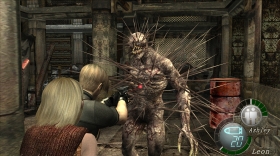
In Defence of Escort Missions
In videogames, the term “escort mission” has garnered a negative connotation, and rightfully so. A lot of games seem to stumble at making the task of protecting someone weaker than the player character engaging, as opposed to frustrating and tedious. However, I think escort missions get unfairly brushed off as being fundamentally bad, when certain games have shown us that escort missions can be executed in a way that helps raise tensions without becoming irritating.
Before continuing, I think it’s essential to try and nail down what exactly makes a good escort mission. For a start, the character that’s being escorted can’t get in the players way, becoming more of a nuisance than anything. Games like The Last of Us and the recent God of War try to bypass this problem by making the companion AI characters invincible to enemies, but to me this feels like a weak concession that undermines the point of an escort mission. I believe that there are two games that manage to strike the perfect balance between creating extra tension with an AI partner without aggravating the players: Ico and Resident Evil 4.
So, what exactly makes the escort missions in these games a positive as opposed to a detractor that dampens the experience? In the case of both games, the characters being escorted need to be protected from enemies, but the direct control given over them prevents them from feeling like an anchor that weighs down the experience.

In Resident Evil 4, players control Leon S. Kennedy, a secret agent tasked with infiltrating a foreign region to rescue the presidents kidnapped daughter Ashley Graham. Upon rescuing Ashley, you need to protect her from the Los Plagas infected residence of the region, and in doing so the entire dynamic of the game shifts. Not only do you need to consider how to approach each situation, but you also need to consider Ashley’s placement in the environment. It’s one thing to get attacked from behind when you’re controlling Leon by himself, but there’s a whole extra sense of threat when you’ve got a defenceless teenager trailing behind you.
Thankfully, Ashley is incredibly responsive and intuitive to control. Ashley can be told to stop in place and follow Leon at the simple press of a button. She can also hide in empty bins and wardrobes scattered around the environments, meaning that you can scout around the area and pick off enemies without having to worry about her getting in the way. Arguably the smartest design choice regarding Ashley is the simple fact that she’ll duck as soon as you aim a gun near her, meaning that you won’t have to get her to move if you’re shooting an enemy that’s closing in on her.
Outside of Ashley’s infamous “Leon, help!” yell, she’s a relatively un-intrusive character considering long stretches of a relatively lengthy game are spent protecting her. Ico arguably tops Ashley’s implementation with its companion character Yorda.

The beating heart of Ico’s beautiful narrative is the relationship between the titular horned hero and the princess Yorda. The two must cooperate together to escape a foreboding castle, but there’s the slight complication of them being unable to communicate verbally due to speaking different languages. Due to this, Yorda must receive very direct commands (much like Ashley), being relatively useless on her own. Controlling Yorda requires the player to hold her hand and physically escort her through areas. Yorda also can’t manoeuvre around environments as skillfully as Ico, which leads to some excellent puzzles where players have to find alternate routes to traverse through areas.
Much like in Resident Evil 4, Yorda will be kidnapped if left alone in combat, which again raises tensions and makes combat scenarios engaging throughout, despite the game having an incredibly barebones combat system. What truly makes Yorda’s implementation shine in Ico however is the mechanics complementing the narrative perfectly, making it a story that could only be as effective as it is in a videogame.
It’s not just the characters forming a bond with each other, players of the game are also likely to feel somewhat protective of Yorda by the time the credits role due to actively protecting and aiding her throughout the journey themselves. What’s more is that escaping the castle and making progression would be impossible without Yorda’s ability to open specific locked gates. Saving also requires the two characters to sit on a bench together, which makes the end-game stretch where the two are separated feel even more isolating and tense.
It seems that having companion characters that aid the player through games isn’t an idea that’s going away. I hope in that case developers can think of more intuitive ways of incorporating these AI companions into games to the same effect that Ico and Resident Evil 4 managed to achieve. Whether it be to strengthen the connection between gameplay or narrative, or to raise tensions in gameplay scenarios, there are benefits that can be met through having a more vulnerable AI partner. Escort missions aren’t inherently bad, far from it, there are just developers approaching the concept in the wrong ways.











COMMENTS